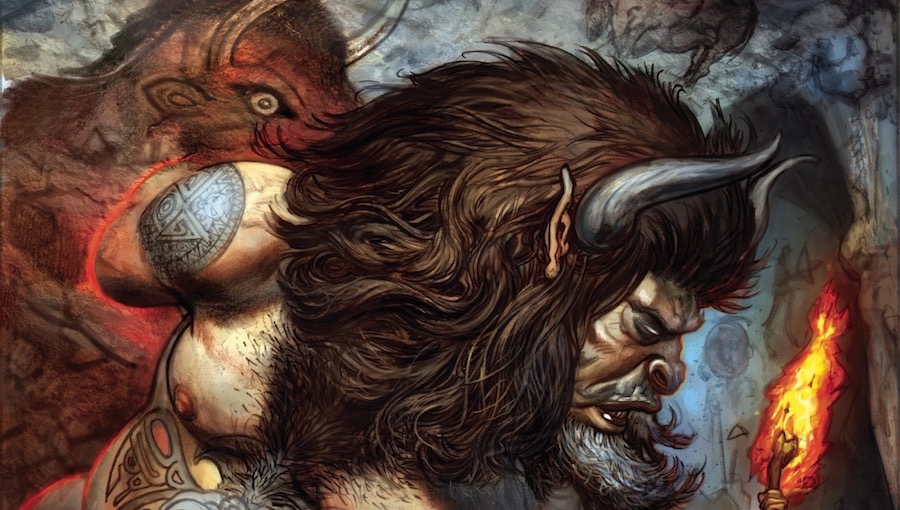My Ainsel #1 marks the beginning of the second arc in the American Gods series adapted from Neil Gaiman’s classic novel. We jump right in to Shadow and Wednesday continuing their travels across America. In this issue, they begin in a snow-covered Wisconsin. The pace of the main action in this issue moves rather slowly, but that gives us time to appreciate all of the other stories that contribute to our understanding of this world.
The storytelling motif in American Gods so far has made the series feel like a compilation of myths, lessons, and historical vignettes. P. Craig Russell continues the trend in this issue. As they enjoy a meal at a family restaurant, Wednesday tells Shadow two tales about conmen whose schemes bring them in large sums of money. These cons are carefully planned and crafted. They require specific props and good timing. Wednesday proudly mentions a history of grift, seemingly enjoying the memories just as much as the success in pulling them off.
The juxtaposition with Wednesday’s stories and his flirting with the waitress make the scene even more amusing. I felt as though I was sitting there at the table with Wednesday and Shadow, getting glimpses into the narrated stories, only to be interrupted by the waitress bringing a drink or offering dessert. It’s a relatable way of interweaving story time with everyday life.
Of course, the weather is getting colder, building anticipation to the storm that was brewing in the first part of the series. The characters frequently refer to the cold, and the temperature certainly helps maintain the bleak atmosphere. Scott Hampton’s art in this issue also contributes to the grimness of the surroundings. People are rather rigid, while the dream world appears as a swirl of blurred colors. Everyone and everywhere are simultaneously a dreary part of America and of the stories that compose the land.
Shadow’s dream sequence suggests that there is a relationship between the waking world and the dream world. Both can potentially have an influence on one another. In his dream, Shadow seeks to find a way to bring Laura back to life in the real world. But he also has a sense that if he dies in his dream, he will die in the real world, as well. Life, death, waking, and dreaming all seem to be commingled—which further blurs lines between reality and fantasy. The entire sequence feels darkly celestial, and Shadow seems to be experiencing a transformative moment. With mythological creatures, gods, and ghosts present in this series, it seems that Shadow, too, must be something more than human—or perhaps has the ability to become something more than human.
Shadow continues his journey solo, but, of course, meets someone new. And Hinzelmann has his own story to share—a tale that sounds real enough but has a few fantastic details. That’s the type of story that really makes sense in American Gods, though. We never really know the truth, because anything seems possible. Sometimes, it feels like everything we read in this series is part of an anthology of dream stories—all contributing to a universe of collected knowledge, trickery, and life (and death) lessons.
Creative Team: Neil Gaiman (story and words), P. Craig Russell (script and layouts), Scott Hampton (art), Rick Parker (letters), and Glenn Fabry with Adam Brown (cover).
Publisher: Dark Horse
Click here to purchase.

